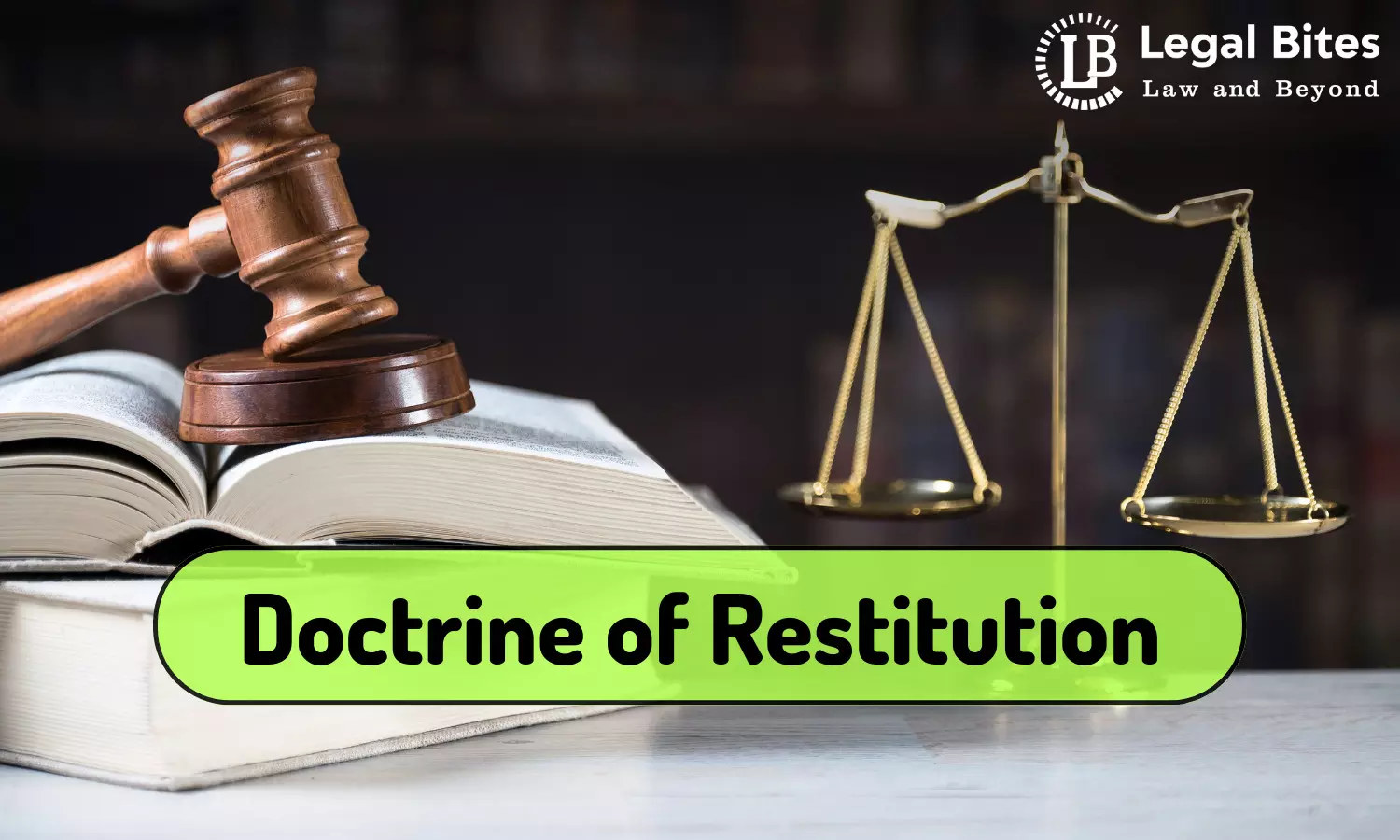The article 'Doctrine of Restitution' discusses a minor's ability to enter into contracts, the characteristics of a minor's agreement, and its ramifications while also emphasising significant case laws.

The article 'Doctrine of Restitution' discusses a minor's ability to enter into contracts, the characteristics of a minor's agreement, and its ramifications while emphasising significant case laws.Minors are entering public life more quickly than ever in today's society. A minor must travel, go to movie theatres, engage with educational institutions, and make several purchases. Because the agreement is worthless, any party can take advantage of the minor or disregard him. Legal...
The article 'Doctrine of Restitution' discusses a minor's ability to enter into contracts, the characteristics of a minor's agreement, and its ramifications while emphasising significant case laws.
Minors are entering public life more quickly than ever in today's society. A minor must travel, go to movie theatres, engage with educational institutions, and make several purchases. Because the agreement is worthless, any party can take advantage of the minor or disregard him. Legal representation of the minor's position under the Indian Contract Act of 1872, whether for or against him, is crucial.
Competence is a prerequisite criterion for either party before entering into any deal, as per the Indian Contract Act of 1872. According to Section 11 of the Contract Act, "Every person who is of the age of majority under the legislation to which he is subject, who is of sound mind, and who is not disqualified by the law to which he is subject, is competent to contract." This article further highlights this.
Introduction
A contract is a legally binding agreement that is supported by consideration, which may be paid in cash or in kind and is defined as such under Section 2(h) of the Indian Contract Act 1872. To legally obligate the parties to the contract's performance is the primary goal of engaging in a contract.
In the typical definition, restitution refers to returning the benefit that someone has received, and its primary goal is first to reinstate the victim's status. "Plaintiff" in a contract action to the initial position he possessed prior to entering into a contract, and secondly to prevent the defendant's unjust enrichment, or to stop him from making wrongful gains to which he is not legally entitled.
The doctrine of restitution's guidelines is outlined in Section 65 of the Indian Contract Act of 1872. It relates to the responsibility of a person who has benefited from an invalid agreement or contract that is rendered void. According to Section 65 of the Indian Contract Act of 1872,
"Any person who has received any advantage under such agreement or contract is bound to restore it or to make compensation for it, to the person from whom he received it, when an agreement is discovered to be void, or when a contract becomes void."
Examples:
- A and B agree to a deal in which A will supply 1 000 kg of apples. While delivering 900 kg of apples to B, A forgets to bring the remaining apples that were agreed upon. The apples that were supplied are kept by B and sold to C. In accordance with the idea of restitution, B is required to reimburse A for the 900 kg of provided apples.
- A stand-up comic accepts a $4000 offer to play in a theatre. The theatre owner gives A an advance payment of $2000. A becomes ill on the day of the performance and is unable to perform at the theatre. A should return the $2000 to the theatre owner per the doctrine of restitution.
- A consents to pay B $2500 in exchange for television and speakers. A agrees to pay the remaining amount after paying an advance of $2000. B was unable to deliver the item because it was harmed in transportation. B is required to give A the $2000 back since A had nothing to do with the transit-related damages.
The Indian Contract Act's Restitution Principle
The main focus of Section 65 of the Indian Contract Act of 1872 is the theory of restitution and how it pertains to the responsibility of someone who has benefited in some way from a null agreement or contract. This part begins with the premise that there was a contract or agreement, and if there wasn't, the doctrine of restitution couldn't be applied. This philosophy is founded on the widely accepted notion that one only shows consideration when receiving something in return.
Only when a contract is later found to be void or when it is declared void by one party or another does the provisions of Section 65 come into play. However, if the contract was void-ab-initio or void from the start, Section 65 will never apply. In the case of Kujiu Collieries Limited v. Jharkhand Mines Ltd, 1974 AIR 1892, the Supreme Court of India ruled that if an agreement is later found to be invalid, Section 65 will come into play, and in that situation, the favoured party is obligated to compensate the disadvantaged party.
Applicability of Section 65
- In the event that a particular step or procedure in an agreement is rendered invalid, Section 65 of the Indian Contract Act, 1872 is applicable.
- If the contract later becomes void as a result of the activities of the parties involved, Section 65 of the Indian Contract Act, 1872 is applicable.
- The Indian Contract Act, 1872's Section 65 does not apply if the agreement is declared void-ab-initio (void from the beginning). It does not apply to contracts that are regarded as illegal.
- Contracts made between a major and a minor are not subject to Section 65 of the Indian Contract Act, 1872.
Exceptions to the Restitution Principle
- When there is no agreement or contract between the parties, the doctrine of restitution will not be applied.
- If a contract is void-ab-initio or void from the start, Section 65 does not apply. If there is a settlement with a minor, the doctrine of restitution will not be applied.
- The idea of restitution only applies to contracts that subsequently become void because of an event the promiser was unable to avert or because of a supervening impossibility, it should be emphasised.
- Except in cases where a juvenile has entered into a contract by falsely stating his age, the principle of restitution does not apply to agreements that are void-ab-initio.
Important Case Law
1. Mohori Bibee v. Dharmodas Ghose [1]
It is true that Dharmodas Ghose owned real estate. To get 20000 rupees, he gave Brahmo Dutt a mortgage on his property. Additionally, there was a 12.5% interest charge on the sum. Dharmodas was a minor when the mortgage was taken out. The court had to decide if it was legal for a minor to join into a contract and whether it was still lawful if the contract's signatory gave a false age. The court found that Dharmodas Ghose was not required to repay the money and rendered a decision in his favour. The court also established rules for determining whether a contract between a minor and a major is legal. The judge ruled that any agreement with a minor is void from the start.
2. S.M. Deshmukh v. Ganesh Krishnaji Khare [2]
The theory of restitution is founded on the idea that the first and most important responsibility of all courts is to ensure that their actions don't harm or wrong the plaintiffs. The obligation or authority of the Court to order restitution is a natural outgrowth of its overall authority to treat all parties fairly and justly under the circumstances.
3. State of Gujarat And Others v. Essar Oil Limited And Another [3]
The test for whether restitution is applicable is whether the act of the party persuading the court to pass an order held in the end to be unsustainable resulted in one party gaining an advantage over the other that it would not have otherwise earned or the other party suffering an impoverishment that it would not have suffered but for the order of the court. Depending on the specific facts and circumstances of a case, the amount of restitution may consider both what the party under duty has made so far and what they could have reasonably made in the absence of the excluded party.
Distinction between Restitution and Compensation
- The act of compensating someone for labour or services rendered is referred to as compensation.
- Restitution is the process of returning something to its original owner or restoring a person to their previous position. Restitution is a legal remedy in which a defendant is required to hand over profits or gains to the plaintiff.
- Compensation, in contrast, is a payment made in response to a loss or harm a plaintiff has sustained as a result of the defendant's acts. Therefore, while restitution concentrates on the amount the offender got as a result of the wrongdoing, compensation concentrates on the sum the innocent party lost.
- In some circumstances, the innocent party may choose to pursue Restitution as opposed to Compensation if the victim's loss (or financial loss) is less than the defendant's unlawfully acquired gain.
Conclusion
According to the Indian Contract Act of 1872, a minor cannot enter into a contract, and the agreement is null and void from the beginning, therefore the position of a minor is to be attained. The minor is unable to rely on the approval of his minority contracts to win a majority. The justification is that ratification occurred when the person was still a child, and as a result, an agreement that was void cannot be made valid. After reaching the age of majority, a new contract can be made with a new consideration if necessary. Furthermore, asking for a modest agreement to achieve a specific performance is impossible because doing so would result in a void agreement. However, a minor is only responsible for the demand for necessities.
References
[1] (1903) ILR 30 Cal 539(PC)
[2] 1975 AIR BOM 82
[3] 1975 AIR BOM 82
Important Links
Law Library: Notes and Study Material for LLB, LLM, Judiciary, and Entrance Exams

Ananya Kukreti
Ananya is currently pursuing law from Amity University, Noida. She has a strong inclination towards policy research and business laws.

